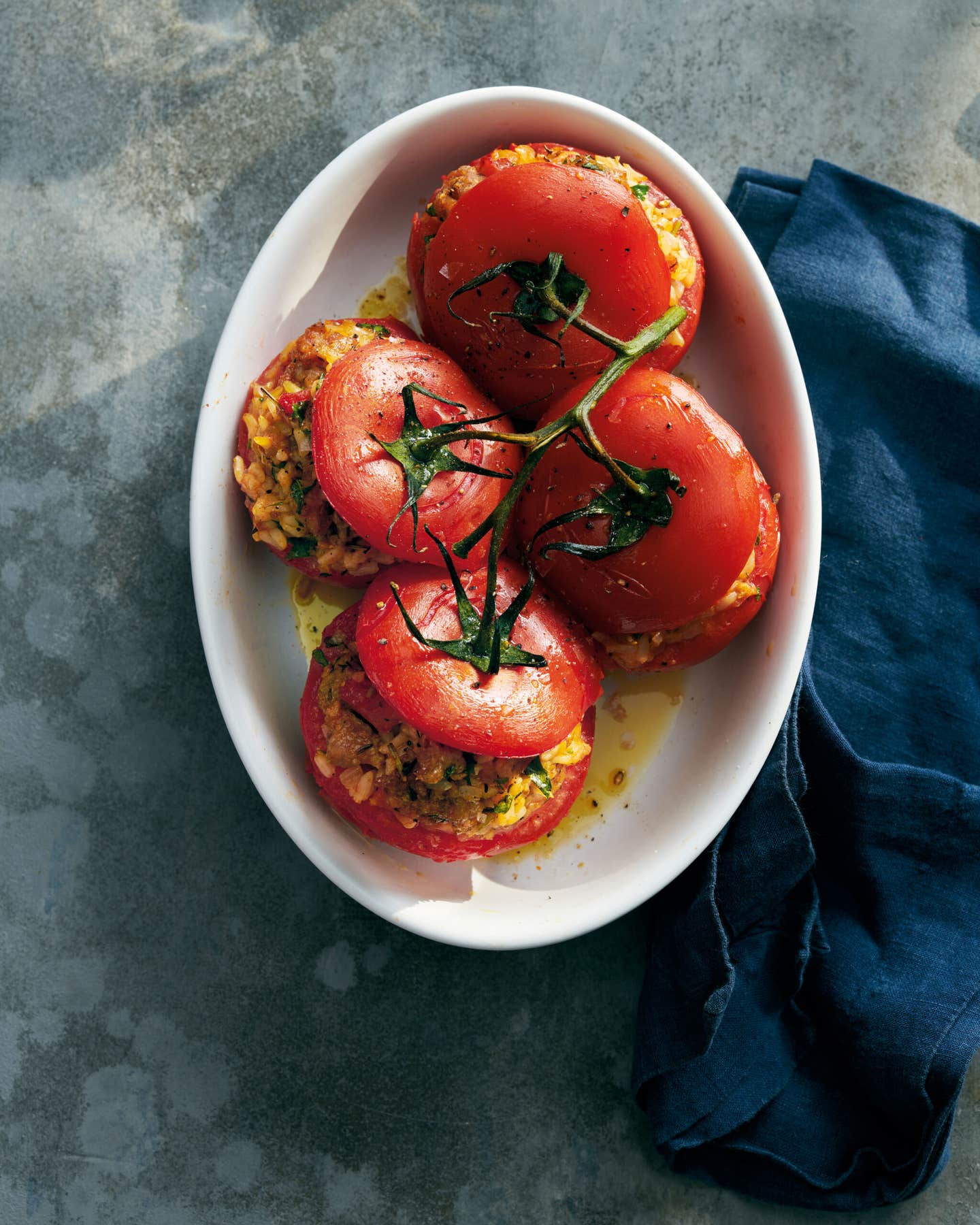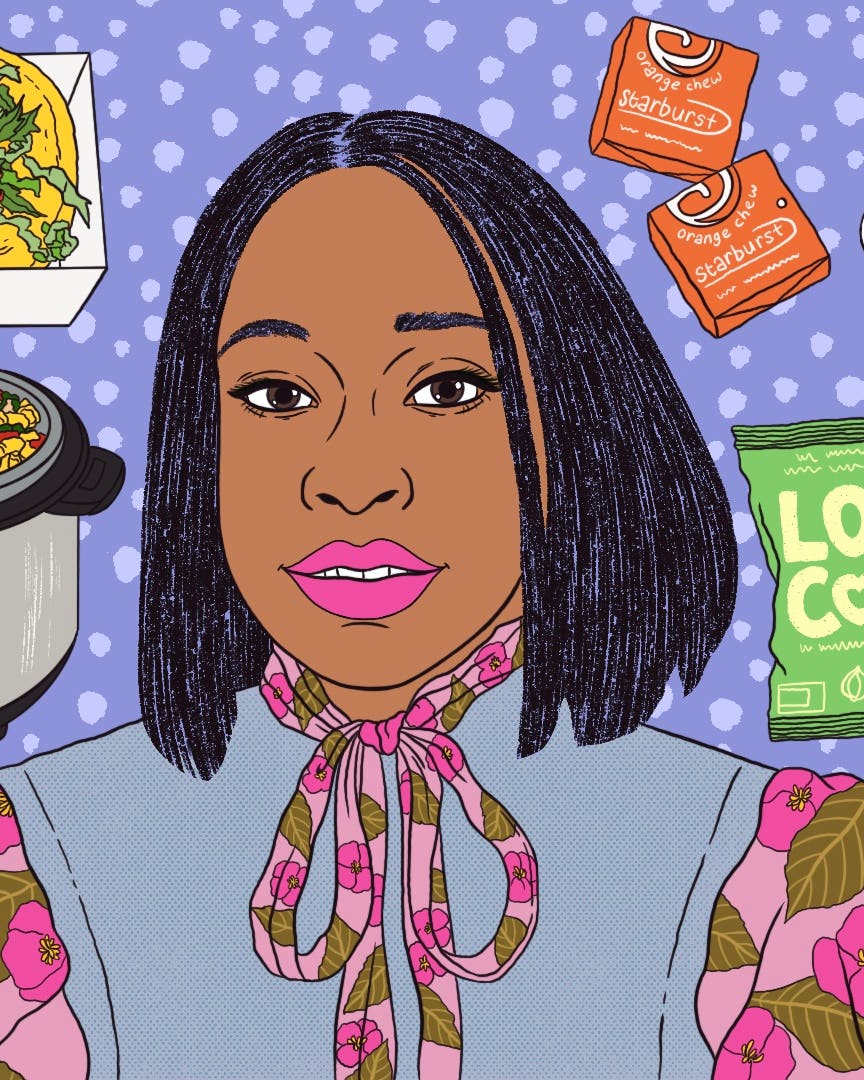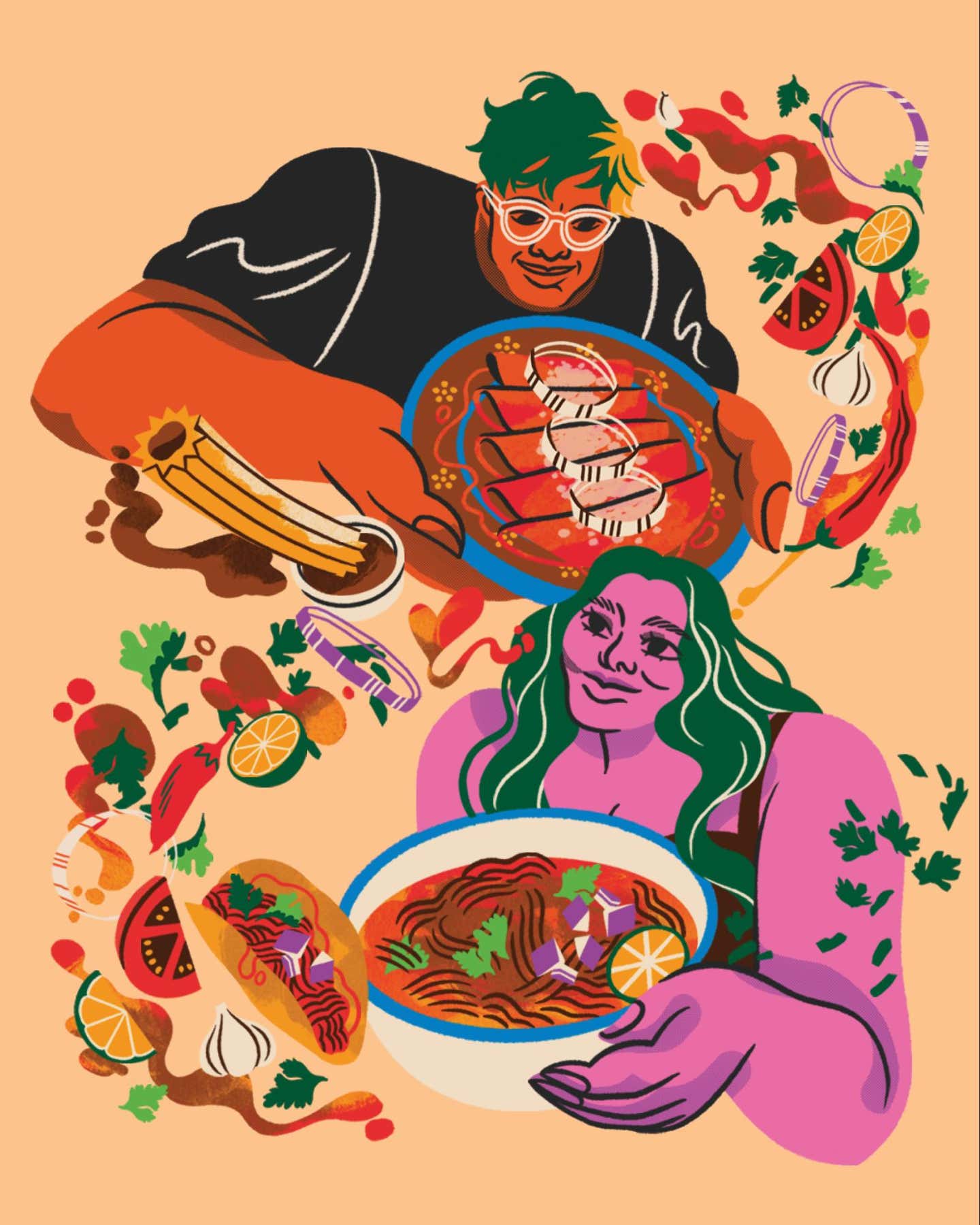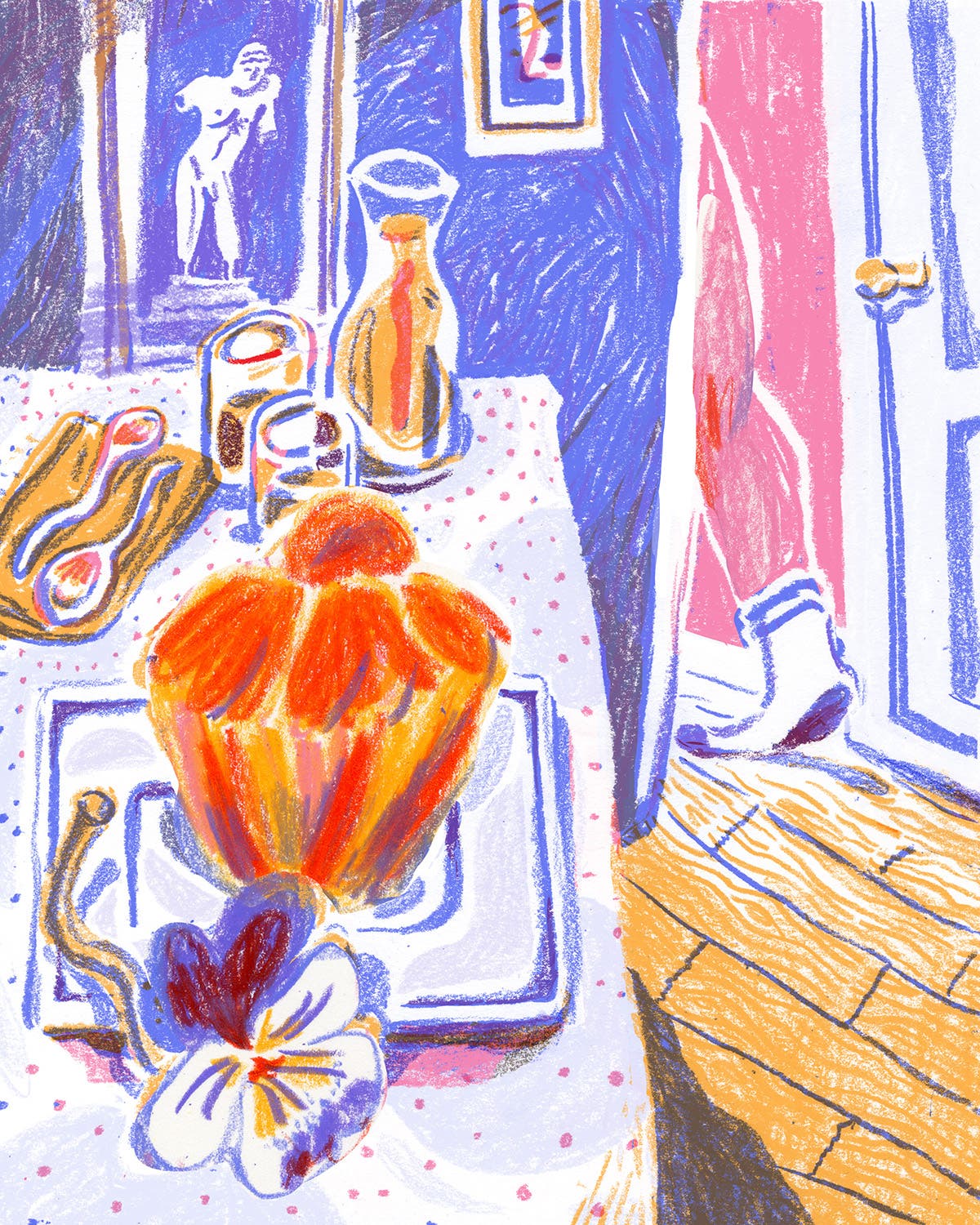Want to Sleep Better? Pay Attention to Your Gut
Why your microbiome might be the key to staying healthy and rested.

Welcome to Gut Check, our column dedicated to the complex, ever-evolving relationship between food and our bodies. Whether you’re curious about mindful eating or want to understand what makes picky eaters picky, read on and let award-winning journalist Betsy Andrews answer all your burning questions.
Recently, I traveled halfway around the world reporting on wine. I sipped and spit during the day, but at night, I swallowed whatever I was drinking along with a lot of rich food. I slept poorly, woke early to meet my schedule, and got little exercise. When I came home, I had deadlines. So with the help of jet lag, I pulled an all-nighter.
After that, my belly ached and my bowels moaned, though I was eating more reasonably. I wondered if sleeplessness could be partly to blame, so I called a friend, Dr. Christina Holt, the program director for Leadership in Preventive Medicine at MaineHealth.
She confirmed my hunch. “The general thinking is not to have digestion cycles interfering with your sleep cycles, so you shouldn’t eat before bed,” she says. The imbalance between my eating and resting was perilous because I wasn’t getting my usual seven hours. “Sleep is finishing the body’s metabolic duties,” Holt tells me. The “unsung hero of body-balancing,” according to Holt, it repairs muscles and preps your immune system to do its job.
No wonder my microbiome—the city of bacteria in my gut regulating many bodily functions—was freaking out. I had given it no time to recover. I have always prided myself on having the energy to burn the candle at both ends. Now I was being told, by my gut and a medical professional, that I was hurting myself. To better understand what was going on—and how to fix it—I turned to more experts. What I learned has changed the way I approach sleep, helping me use rest to take care of my gut—and it may help you and your gut, too.
Sleep Smarter
A good night’s sleep—the kind that makes you wake up refreshed—requires falling asleep within 20 minutes, staying asleep with fewer than 20 minutes’ interruption, and getting at least seven hours of shut-eye, says Dr. Marie-Pierre St-Onge, PhD, director of the Center of Excellence for Sleep & Circadian Research at Columbia University Irving Medical Center. If that sounds like you, you’re one of roughly 60 percent of lucky Americans, according to the Centers for Disease Control and Prevention. That nearly half of us start the day depleted is a problem of national import that not enough people talk about. In her new cookbook, Eat Better, Sleep Better: 75 Recipes That Unlock the Food-Sleep Connection, written with SAVEUR editor-in-chief and CEO Kat Craddock, St-Onge emphasizes, “Getting good sleep is vital for cardiometabolic health”—the gut microbiome included.
In a healthy microbiome, a variety of beneficial bacteria work to keep your gastrointestinal system balanced and resilient. As diversity declines, bad bacteria take charge, which is what happens when you’re stressed due to a lack of sleep, notes Dr. Elizabeth Swenor, Medical Director of Lifestyle, Integrative, and Functional Medicine at Henry Ford Health. A less healthy microbiome, in turn, can increase the risk of obesity, hypercholesterolemia, hypertension, and type 2 diabetes.
But how much you snooze is just one dimension of healthful sleep. There’s also your bedtime. “The circadian clock is embedded in our DNA,” Swenor explains. “Its rhythm is set around sunrise and sunset. Our microbiome is synched to light.” Most of us go to bed far past sundown, often by necessity: In industrial societies, up to 20 percent of workers labor beyond the standard 9-to-5. Where your gut is concerned, that circadian disruption is associated with glucose intolerance and weight gain. “Our bacteria are maladapting to our modern demands,” says Swenor.
Another aspect of healthy sleep is regularity. Our bodies work best when we nod off and wake up at the same time each day. “If your sleep timing is variable, you have a higher risk of cardiovascular disease and diabetes,” says St-Onge. That’s in part because tired people rely more on ultra-processed foods, eating more sugar and carbs for energy.
Dr. Sarah Berry has studied sleep variability as the associate professor of nutritional sciences at King's College London and chief scientist at Zoe. When I called her, she was digging in the dirt. “I was trying to get over jet lag by gardening in the sun,” she tells me. That’s important because jet lag and what she calls “social jet lag” (switching from early bedtimes on weekdays to late nights and sleep-ins on weekends) affect your circadian biology, disrupting your diet. Berry’s research shows that people with social jet lag eat fewer plants and down more sugary drinks.
The Negative Food Feedback Loop
When you’re dragging, the reward centers in your brain light up with yearnings for high-calorie, low-nutrient foods, which negatively affects your gut. For instance, after eating a jelly doughnut, your blood sugar skyrockets, and when you’re less rested, that glycemic spike is more pronounced. A couple hours later, your blood sugar plummets. “You’re on this rollercoaster,” Berry says. “You have less energy, you’re less alert, but you’re consuming more calories—300 more over the day if you have a bad breakfast—so you’re hungry and seek out more and more food.” Your gut is one of the rollercoaster’s operators: “The microbiome releases chemicals that impact sleep,” so you end up having another bad night.
Your gut also induces the release of ghrelin and leptin, two hormones that regulate appetite. “Both are disrupted with sleep deprivation,” says Holt. Research shows that a single sleepless night can mess with these hormones, leading to a carb craving. “Over time, the body says, ‘Let me make it easier for the carbs to get jammed into the cells and do their job.’ Then you gain weight and get prediabetic.” But you can reverse the trend. In one study, “short sleepers” who got more than their habitual few hours naturally decreased their sugar intake.
The Sleep-Friendly Diet
Nutrition is a driver of sleep health, and according to St-Onge, a good diet results in the creation of melatonin, the hormone that helps you sleep through the production of short-chain fatty acids. (I’ve written before about short-chain fatty acids; they do wonders for your body, and your gut produces them by processing fiber.)
Fiber-rich foods are widely believed to have a positive effect on sleep. That’s why St-Onge and Craddock’s book is filled with whole-grain and plant-based recipes, such as Provençal stuffed tomatoes and buckwheat crêpes with a spiced apple filling. Of course, fiber also keeps you regular. As Holt points out, “Eating enough fiber to make a soft and moveable bulk helps the digestive system not act up and disrupt your sleep.”
Tryptophan is another important snooze-inducing compound. An essential amino acid, tryptophan helps produce melatonin and serotonin, a neurotransmitter that aids your body in relaxing. Red meat and turkey are high in tryptophan, but St-Onge doesn’t recommend eating much animal protein. Instead, she favors tryptophan-rich legumes, nuts and seeds, whole grains, and tofu. Tryptophan, St-Onge points out, tends to work better in combination with complex carbohydrates.
She also recommends consuming fruits and vegetables that contain the nutrients that help your body synthesize tryptophan: almonds and pumpkin seeds for zinc, bananas and beets for magnesium, vitamin B-rich collards and broccoli, lentils full of folate. (Bananas, tomatoes, and oranges naturally contain melatonin and serotonin.)
Then there are foods that help your gut microbiome produce a GABA effect (by triggering the inhibitory neurotransmitter gamma-aminobutyric acid). This calms your nervous system, readying it for sleep. Swenor points to sprouted beans, peas, steel-cut oats, spinach, and many other vegetables for their naturally sedative properties.
Fuel Your Day, Not Your Night
The most important meal for a restful night is, ironically, breakfast. That’s because the nutrients you need for melatonin production take at least five hours to reach the gut. What’s more, come nightfall, you naturally burn less fat and become more insulin resistant.
Perhaps that’s why Holt’s patients commonly complain of indigestion. “It’s best to be upright for a couple hours after eating, so digestive juices are not secreted in a horizontal state and potentially refluxing up into the esophagus,” she says.
So much for those long, late dinners on the road—unless I just stay up afterward getting work done or partying, right? Wrong: That would make my digestion even worse, as dancing, writing, and other stimulating activities pump more blood to my muscles and brain. “Your parasympathetic system wants to divert blood flow to your stomach and intestines, so you can digest,” says Holt.
But sometimes, we all need a late-night treat. That’s where moderation and knowing your limits come in: “Humans are eminently adaptable,” says Holt, while stressing that circadian rhythms are generally ingrained. So I can continue enjoying after-dark hawker markets, post-theater brasseries, and midnight pasta—occasionally.
Anyway, going to bed hungry isn’t healthy, either. That would only “promote nausea and heartburn,” says Holt, in turn disturbing your sleep. If you’re hungry at night, St-Onge suggests snacking a couple hours before bedtime on easily digestible foods.
My 7 Commandments
Newly convinced that sound sleep would help soothe my microbiome, I devised a series of mantras, informed by my research, to help put me on track:
- Eat mostly plants. Fruits, vegetables, nuts, seeds, and whole grains enhance sleep, while ultra-processed foods do not.
- Set a sleep schedule. Wake and go to bed at the same reasonable hour each day, and shoot for seven hours. St-Onge notes that, “Overall health indicators favor the early birds.”
- Limit midnight fridge raids. Eat early in the evening so your gut has time to digest. Swenor suggests a light dinner before 6:00 p.m., followed by a nightly fast.
- Go outside and move. Exposure to sunlight regulates serotonin and balances your circadian rhythm, and studies show that exercise helps you sleep better.
- Get a jump on jet lag. “When preparing for travel, acclimate your body to the time zone at your destination by adjusting the times you go to bed and eat,” says St-Onge.
- Scrutinize sleep supplements. In a pinch, reach for a sleep aid with a Good Manufacturing Processes (GMP) certification from the National Sanitation Foundation, such as low-dose melatonin; 5-HTP, shown to regulate and support serotonin pathways; or GABA-producing lactobacillus.
- Scale back screen time. “Small changes can accumulate,” says Berry. “I sit in bed scrolling Instagram, knowing I shouldn’t. But we can all practice [better] sleep hygiene by not having screens in bed.”
The last point is tough. I’m a freelancer, and though that term includes the word “free,” deadlines sometimes mean working round the clock. That’s bad for me and my gut. Swenor says most of us—including her—would benefit from more restorative time. “Instead of staying up until 2:00 a.m., my deadline is 10:30 p.m.. If the work is not done, it’s not done,” she says.
That’s not only good sleep hygiene; it’s a healthy attitude. These are hyper-stressful times, and I have a gut feeling that to withstand everything coming at us, we could all use a good night’s sleep.
Keep Reading
Continue to Next Story










